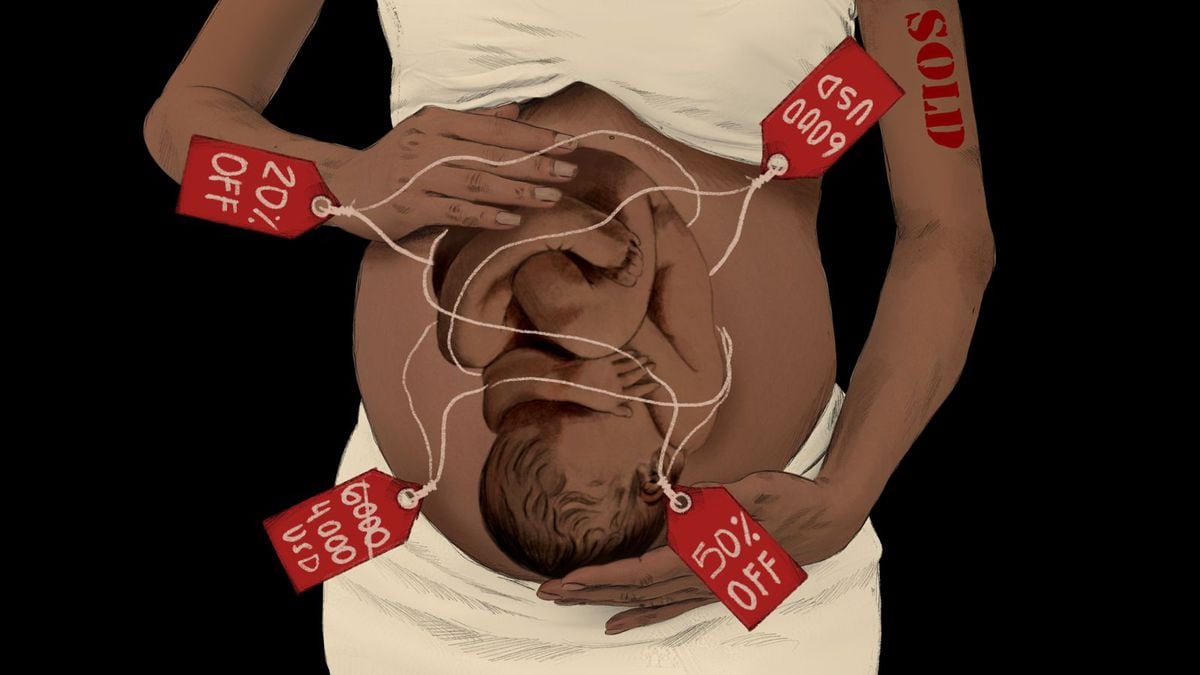“Every minute of every week they steal our friends, they kill our sisters
They destroy their bodies they disappear
Don't forget their names, please, Mr. President."
The music interrupts the crowd covered in purple on the outskirts of the Office of the Attorney General of the Nation, one of the meeting points of the mobilizations that took place on March 8 in Bogotá.
The women suspend the painting of banners they design above the floor.
"Do you get tired of hearing it?
We live it ”, says one of the posters.
They stop to sing
Canción sin Miedo
, the composition by the Mexican Vivir Quintana that became a feminist anthem and was performed for the first time by Mon Laferte in 2020, in tribute to women victims of exclusion and all kinds of violence.
Its lyrics have been adapted to also recall the Colombian reality, that of girls and women who are raped and murdered.
"I'm brenda
I'm Adriana
and I'm Xiomara
Rosa Elvira, Alejandra
and I'm Yuliana
I am the girl that you raised by force
I am the mother who now cries for their dead
And I'm this one that will make you pay the bills
Justice, justice, justice"
The women sing a loud cry.
It's not the only one.
They express themselves in all possible ways so that they can be heard: their bare breasts exposed to the cold of an afternoon that threatens rain, their faces covered in luminous makeup, green scarves covering different parts of the body.
"For my rights and for those who come", he is stamped on the garments.
Posters and flags stand out among the sea of women who form the march.
Their voices are heard, the rumble of drums and the shaking of spray cans.
The smell of paint invades the protest, another that is repeated in one of many places in the world, more than a century and a half after that strike by women from the New York textile industry who fought for equal pay and was repressed in 1857. More than a hundred of them lost their lives in the tragedy that would mark the commemoration of International Women's Day.
Today there are still plenty of reasons to march, warn the feminist groups that organize the mobilizations.
“Every 20 minutes in Colombia, a woman or girl denounces sexual crimes.
We have the right to a life free of violence, to move through safe spaces," they stated in one of the calls, citing figures from the Prosecutor's Office.
"I'm marching because I'm alive and I don't know how long," they harangued.
In 2022, 619 women were victims of femicide, according to the Colombian Femicide Observatory.
This year there are more than 30 cases.
"Not one less, we love each other alive," expressed the protesters.
Four out of ten murders of women are committed by their partner, ex-partner, relatives or people they know, says a 2022 Dane report that collects official statistics.
In the center of Bogotá, groups of women lit a bonfire in which they burned pieces of paper where terrible experiences of abuse and rape were written.
“In my family there is an abuser.
I'm tired of Colombian families covering up abusers.
Nobody does anything for us,” said one of the victims.
"You are not alone, you are not alone," other women shouted in support.
“I had a cousin and an uncle who touched me from the age of 12 to 14.
When I said what had happened, they didn't believe me,” said another young woman.
"It's not your fault, it's not your fault," she responded in chorus.
Women of all ages joined the protests.
One of the participants, Oriana Lugo, was accompanied by her eight-year-old daughter.
“We come with another friend who, like me, is a single mother.
We want our daughters to learn from an early age about their rights and the value of being a woman.
They are understanding it and reinforcing these messages, ”she explains.
With her fingers moistened with temperas, Oriana's daughter wrote on a piece of cardboard: "You are going to be the woman you want."
Adolescent fertility rates, between 15 and 19 years old, represent an alert for girls and young people.
According to data from the Ministry of Health and Social Protection in 2019 and 2020, the rate was 57.9 and 53.8 births per 1,000 women, respectively.
The figures are high considering the goal for 2030 of 46 births per 1,000 women.
In 95% of births to mothers between the ages of 10 and 14 and in 76% of births to mothers between the ages of 15 and 19, the father is older than the mother.
Organizations such as Somos Jacarandas warn that most of these cases may be the result of sexual abuse.
Although abortion is legal in Colombia until the 24th week, 17% of women say they have been judged or mistreated at the time of abortion.
"The traffic jam bothers them but not the rape", shouted women in the marches.
Curious they went out to the streets to observe.
Others to offer support.
“For me it is good that the marches are carried out.
I have a wife, daughter and sisters and I don't want anything to happen to them, that they be exposed to rapists, thieves, murderers.
My wife was almost killed for stealing her cell phone,” says Fabián Puerta, an employee of a pizzeria who came out to witness the demonstration.
"Sir, madam, do not be indifferent, women are killed in the face of the people," stressed the protesters.
Women's voices were raised in various areas of the city.
In the south of Bogotá, workers gathered at the intersection of Avenida Primero de Mayo and Carrera 27, where they organized a popular pot to involve the neighbors in their call.
Jeniffer Mayorga, one of the leaders, had participated in the marches in the center, but this time she wanted to decentralize the commemoration.
"We live in these neighborhoods, we are students and workers," she said.
The economic gap between men and women is another reason for protest.
At the beginning of 2022, for every 100 men in the labor force in Colombia there were 73 women, according to Dane.
Last January, while the national unemployment rate for men stood at 11%, for women it was 17.4%.
The average wage difference for 2020 was 5.8%, which means that women earn 94% of what men earn.
Women with higher education earn less than men with the same level of education.
In contrast, women spend an average of 7 hours and 46 minutes daily on unpaid domestic and care work, while men spend 3 hours and 6 minutes, a difference of more than four hours, says the 2020 national time use survey. -2021.
With the impact of the pandemic, a generation of women joined the wait to achieve gender parity globally.
The time it will take to close the gap increased from 99.5 to 135.6 years.
Closing the wage gap would take 267 years, says the World Economic Forum's 2021 global report on the gender gap.
All these realities prompted nearly 3,000 women to cover the streets of Bogotá with their steps.
The main mobilization, which started from the Prosecutor's Office, reached the National Center for Memory, Peace and Reconciliation, a space that pays tribute to the victims of the armed conflict and that remembers the past to try to build a different future.
"Without gender peace there can be no possible peace," says one of the women at the end of the march.
The day darkens, but not the voices of the women who are still willing to make themselves heard.
Subscribe here
to the EL PAÍS newsletter on Colombia and receive all the latest information on the country.




/cloudfront-eu-central-1.images.arcpublishing.com/prisa/L6TCOQ5HGZCWTOW6YNBMMGDKBA.jpg)




/cloudfront-eu-central-1.images.arcpublishing.com/prisa/SELJZCEZBNDZBPMNSIAZKYPXGE.jpg)